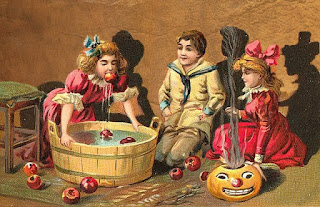Today, Halloween is celebrated around the world. For most of us, the word conjures up dressing up in costume, scary decorations, handing out candy to children who come to the door and plenty of costume parties. But did you know it is a day of fruits and vegetables to help you learn about who you are going to marry?
Ancient origins of Halloween
Before we get to those traditions, let's take a quick look at Halloween’s origins. They can be traced back about 2,000 years to a Gaelic festival called Samhain, held at the end of the harvest season. At that time, the Celts celebrated the start of the new year on November 1. The celebration of the Festival of Samhain was a two-day event which started on October 31.
People at that time believed that on the eve of the new year, dead spirits could come back to life and so the people wore masks and other disguises to blend in with the evil spirits. Why? They thought that if these spirits happened to pay a visit, the disguises would trick them into thinking they were one of them.
By 43 A.D. the Romans picked up the tradition and made it their own. They had a custom of celebrating the passing of the dead in October on a day they called Feralia, and so they combined that with the celebration of Samhain. By the 9th century, the Catholic church picked up on the celebration to include all saints and martyrs, and November 2 was labeled “All Soul’s Day.” This was most likely an attempt to replace the Celtic festival with a church-approved day.
6 Halloween traditions that tell you who you will marry
Ring in the mashed potatoes: One long-forgotten Halloween
tradition deals with figuring out who you were going to marry. Imagine an 18th-century
Irish cook burying a ring in her mashed potatoes on Halloween night in hopes it
would bring true love to the guest who found it. (Every time I hear ideas like
this, I can’t help but thinking of the unlucky person choking to death instead
of finding true love).
In early 20th century Scotland, hosts mashed up a big tub of potatoes and hit the ring, button or coin, and a thimble. Guests gathered around the tub with spoon in hand and lights off. Each dipped their spoon into the spuds in hopes of getting the ring. If a boy found the button or coin with his spoon, he was destined to be a bachelor all his life. If a girl found the thimble, she would be a spinster, but the person who found the ring was fated for marriage and happiness.
Naming hazelnuts: The Scottish tradition of naming hazelnuts was safer health-wise. Fortune-tellers suggested that eligible young women name hazelnuts for each of their suitors. Once named, they tossed them into the fire blazing in the hearth, one at a time. If a nut burned to ash instead of exploding, the name of that nut signified the girl’s future husband. With that said, I’ve also heard that the opposite interpretation was true saying that the nut that burned predicted that the love wouldn’t last.
Eating dessert before bed: Another Halloween wedding superstition includes the consumption of a sugary treat made with walnuts, hazelnuts and nutmeg. It had be eaten before bed on October 31. Women who followed this practice were said to dream about their future husbands.
Apple peels: Another food-related Halloween superstition includes apple peels. Young women threw the peels over their shoulders and turned to see how they landed on the floor and then interpreted them as the initials of their future husbands. The catch is, you had to keep the peel from a whole apple in one piece!
Egg yolks in water: This Halloween marriage-predicting superstition started with egg yolks floating in a bowl of water. Divination using eggs, known as Oomancy, took on various forms. Candles are another common tool for divination. This particular practice uses both. A woman stood in a dark room holding a candle in front of a mirror to try to learn about her future. She peered at the egg yolks floating in the bowl of water and then looked over her shoulder to see her future husband’s face. I wonder how many times had to try to see something. And what if they saw a face they didn’t like?
Bobbing for apples: This last superstition is one we are familiar with, bobbing for apples. Fun, right? Author Joan Morgan, co-author of The New Book of Apples says, "apples, apple peels and even pips have long been used to peer into the romantic future." Bobbing for apples is one of these ways and became a popular game. Girls marked their apples in a way no one else would know and added them into a barrel of water. Then, potential beaus tried to grab the floating apples with their teeth. The first one to successfully get an apple was thought to be the first one that would walk down the aisle.
* * *
Some links in this post are affiliate links. We are a participant in the Amazon Services LLC Associates Program, an affiliate advertising program designed to provide a means for us to earn fees by linking to amazon.com and affiliate sites.







